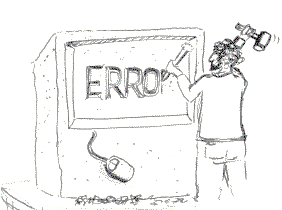
"PEOPLE IN HISTORY WERE SOooo SIMPLE -
I often hear people say something like this. |
|||
|
Oh no they won't!
The computers made 15 years ago are now rare.
The ones we make now can't read the discs they used - how many people do you know still using a Sinclair computer?
... or use 5-inch floppy discs?
|
|||
| I'm told that CD discs last up to about 15 years before they de-laminate... or fall to bits. - even assuming anyone's still got a CD player in 15 or 20 years' time. |        |
||
| Video and audio tapes both lose their ability to keep the magnetic patterns which store the information | ... or so I wrote when I did the first version of this website in around 2000. Hands up all those people who still use Video recorders and haven't got a DVD machine. Hands up all those people who still have some now useless Video tapes hanging around which they mean to clear out.... |
||
| Paper starts to rot after a few years. Cheap paper is wearing out after 50.
Ink fades on the bleach used to keep modern paper white. My mother was born in 1914. Her birth certificate is still perfectly clear. She died in 2008. |
The registrar signed her Death Certificate and told me that by the time that's 94 years old,
the details will all have vanished, as the computer printer ink fades. The only thing left on the otherwise blank paper will be the registrar's signature. By law they have to use special fade-proof, fire-proof, water-proof ink. That'll be really useful to future historians, then. |
||
|
The very best paper modern technology can produce apparently is going to be wearing out after
500 years. Apparently old newspapers used better paper than we do now.
I have copies of newspapers from the 1800's in good condition. Look at newspaper sheets
from about twenty or so years ago next time you find them in an old drawer or something, and they're often falling
to bits already.
I have met 300-year-old paper still in quite good condition. So, when Parliament nowadays makes laws and wants them to be stored so they last, they're written on parchment or vellum - sheep or calf skin dried and cured, scraped very thin, and stretched out. This process was used by the monks who wrote over 1000 years ago. It's still the best way known to modern human kind to keep information so it won't rot away or fall to bits, (and it's all made in one factory in Newport Pagnell, near Milton Keynes). |
|||
| If you get the chance, visit places like the British Museum where they have manuscripts of 1000 years ago, and see the bright colours and deep black of the ink they made, still preserved on vellum and parchment. |

|
||
| OR if you really want it to last, try carving it in stone. ... like the people of 1000, 2000, 3000 and more years ago! | |||
 Return to top of this page.
Copyright ©: 2009, Richard York
Return to top of this page.
Copyright ©: 2009, Richard York